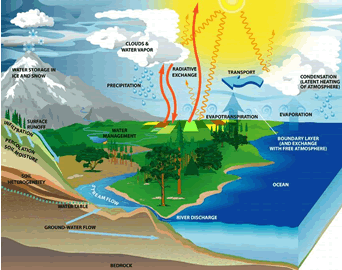Water cycle plays a crucial part in shaping the earth's climate. One of the major manifestations of Earth's climate change would be in terms of water cycling, which includes changes in regional precipitation regimes, evapotranspiration and evaporation rates and the frequency of meteorological and hydrologic extremes (severe weather, floods and droughts).
Such changes would in turn impact water management, agriculture, construction, transportation, communications, marketing, energy production, etc. Furthermore, the increasing density of human activities and settlements at coastal regions and flood plains posses an even further enlarged threat for loss of life and property being at risk due to extreme events (e.g., heavy precipitation). Moreover, changes in water cycling and resulting alteration of coastal wetland characteristics (e.g. size, vegetation, soil composition, water storage, retention of carbon) affect river runoff and watershed discharges and, consequently, nutrient fluxes and delivery of dissolved and particulate carbon to the coastal zone. Arguably, acquiring an accurate documentation of present water cycle/climate state and advancing our capability to predict short and long-term variability of water cycle parameters and quantifying extremes are instrumental to accomplish a benefit to society.
At the Hellenic Centre for Marine Research (HCMR), Greece, the PreWEC project is exploring the possibilities of enhancing this predictability. The project, initialized in January 2007, is a Marie Curie Excellence Grant funded under the EU Sixth Framework Programme. The research team of PreWEC is currently focusing on three major areas in their pursuit of enhancing water cycle predictability. These are:
This massive undertaking is being facilitated through collaboration with two other research projects in the field - the first on issues related to coastal ecosystem pollution and the second on the assimilation of satellite data in numerical weather predictions. In addition, discussions are underway to establish an experimental hydrologic observatory in one of the watershed/coastal ecosystems in Greece that would be based on synergistic measurements taken by PreWEC and other research programmes in the Institutes of Oceanography and Inland Waters at HCMR.
|
Predicting Floods With Distributed Hydrological Models
Using Satellite Data to Study Water Cycle Parameters
Measuring Rainfall Using Mobile Weather Radar
Measuring Rainfall over the Oceans Using Underwater Sound Data
Numerical Weather Prediction Air- Sea interactions
Coastal Ecosystem and Water Quality Climate Research
Soil Water - Climate interactions
|
Hellenic Center for Marine Research - Institute of Inland Waters PreWec Marie Curie Excellence Research Team |
People



